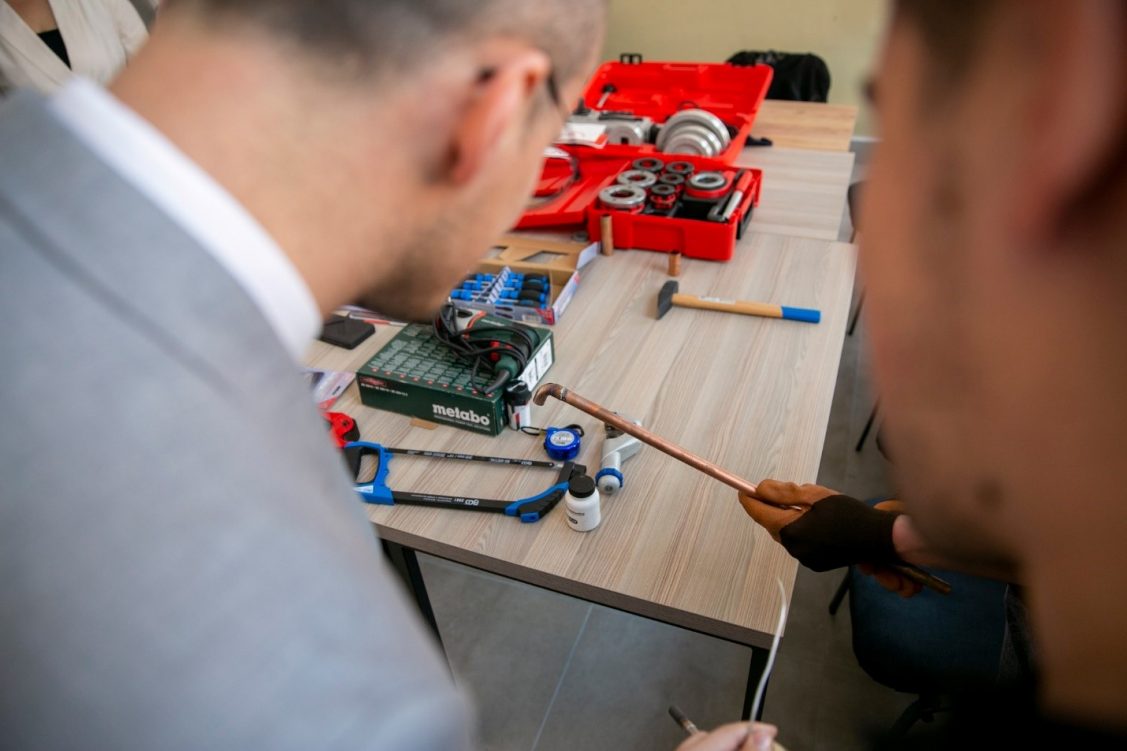August 7, 2023 | Monday
The EU has been providing support to Kosovo for several years in the reform of vocational education and training (VET) to enhance the quality of VET through the development of qualification sets that align with the latest trends in the labor market. To gain further insights into the project, we interviewed Daniele Passalacqua, the Chief Technical Adviser who is spearheading the Project Support to VET reform in Kosovo at LuxDev.
EH: In what ways do you perceive the project “KSV/801 European Union Support to Vocational Education and Training (VET), Professional Requalification, and Occupation (ESVET PRO)” to have played a significant role in the process of reshaping and enhancing vocational education and training in Kosovo?
DP: The Project played a significant role in reshaping and enhancing vocational education in Kosovo. By aligning with national priorities and European integration goals, the project focused on improving the quality and relevance of VET education. It introduced modular integrated curricula, emphasizing a competence-based and practical approach while increasing the level of cooperation between schools and the Private Sector (PPP) and enhancing employability.
Nevertheless, the Project was focusing on two other innovative targets: the first aimed at establishment and implementation of services for the recognition and validation of non-formal learning and education in the TVET sector, while the second aimed at the institutionalization and operationalization of Tracer Studies at national level. These efforts contributed to a comprehensive reform of the VET sector, providing tangible opportunities of professional requalification to adults and jobseekers, and created the basis for a wiser and more conscious decision making for the governmental institutions and for all the donors and international partners.
EH: In your view, what are some specific initiatives or programs implemented under the project that have yielded remarkable results and brought about substantial advancements in vocational education within Kosovo?
DP: The Project has successfully advanced vocational education in Kosovo through impactful initiatives. Firstly, it has diversified and modernized vocational education by developing and updating Qualification Sets (Occupation Standards, Curriculum, and Teaching and Learning Materials-TLM), aligning them with labor market demands. The Project has also prioritized the capacity development of teachers for the schools supported by the project, advancing skills and resources to deliver high-quality education. Additionally, state-of-the-art technical workshop equipment has been provided to enhance learning environments. At the same time, the adoption of new technologies has contributed to the digitalization of teaching, learning, and assessment processes.
Furthermore, the Project has established a robust and sustainable system for the Recognition of Prior Learning at the national level, following European guidelines for the Evaluation and Validation of Non-formal and Informal Learning. This process involved not only the National Qualification Authority and a high number of public and private TVET institutions; it also saw the central role of the Kosovo Employment Agency and all the VTCs for adult education. This component supported all the aspects for the operationalisation of RPL in Kosovo, including the development of manuals and guidelines, the adaptation of legal framework, the development of capacity at central and school level, and the training of assessors, mentors and evaluators involved in all the steps of the process.
Finally, the Project has developed the National Graduate Tracking System, the first of its kind in Kosovo. This system ensures continuous assessment of graduates’ employability and skills relevance. Also here, the support had involved all relevant stakeholders, including the civil society. For the development of the national model and guidelines for the implementation of Tracer Studies, until the legal framework and the capacities at all levels; it was crucial the digitalization of the process, through the development of a TSIS (Tracer Studies Information System).

EH: How does the project ensure that vocational education planning and provision are responsive to the needs of learners and employers in selected vocational schools in Kosovo?
DP: As mentioned before, the establishment of a Graduate Tracking System (Tracer Studies) contributes, for the first time, to provide evidence of graduates’ employability, skills acquired and their relevance to the demand of the labor market, together with the measurement of the level of satisfaction of the graduates and their employers. Therefore, the combination of the quantitative and qualitative data acquired will lead the policy makers into a rationalization and optimization of the TVET offer, while helping them to identify the right paths for future development and the remaining needs requiring further investments from the government and from the Donors (EU as a first).
This was also integrated with ad hoc interventions in selected VET schools, where the educational offer was improved with new curricula, capacity development for teachers, equipment and PPPs, oriented by Labour Market Information research and feasibility studies in various sectors and profiles.
It was crucial the cooperation with the Employment Agency of the Republic of Kosovo (EARK) in developing the legal framework and operational arrangements for Active Labor Market Measures (ALMM), and the constant involvement of all the vocational training centers focusing on adult education. Also here, digitalization was a key factor, in fact the Project supported the further development of EARK’s information system “Employment Management Information System (EMIS)” with a module to facilitate the operationalization and reporting of RPL.
Furthermore, the Project has contributed to improving vocational schools’ qualitative and financial sustainability by supporting the development of the Business Model Approach. It is a new entrepreneurial TVET Schools’ management System, focusing on the application of the best corporate governance tools and practices to the management of public schools. This approach increases the efficiency and the financial sustainability of TVET schools, while promoting the establishment of strong partnerships with the private sector, aligning vocational education with industry needs. All these integrated components enhance each other’s outcome and impact to ensure that vocational education in Kosovo is closely connected to the labor market, enhancing the quality, relevance, and long-term offer of vocational programs.

EH: What challenges do you consider to be involved in the implementation of the project aimed at improving the quality and labor market relevance of education and training programs, with the goal of facilitating the transition from school to work for VET students and enhancing the employability of VET graduates?
DP: The restrictions implemented due to Covid-19 have led to the closure of schools, public offices, and private companies during S1 2021, limiting the ability of the Project to implement the planned interventions that required direct involvement and in-person meetings with relevant stakeholders engaged in VET. From the lessons learnt, we all should be more prepared for the future to face massive crises.
Companies do not always have adequate capacities or incentives to cooperate with the public TVET sector. I think more support for the private sector is required. Promoting their role and direct involvement in Development Cooperation Projects, not always under the leadership of governmental institutions, could be one way to buy them in and guarantee a sustainable partnership.
EH: What are the project’s upcoming plans and objectives in its ongoing efforts to advance and strengthen vocational education and training in Kosovo? How does it aim to further enhance the quality and accessibility of vocational education opportunities in the country?
DP: The project is approaching its conclusion in December 2023, therefore it will continue with the implementation of its plans as foreseen by the project document. A crucial task will be the conduction of an Awareness Campaign at National Level for the promotion of Recognition of Prior Learning and the opportunities of Evaluation and Validation of Non-formal Learning for adults and jobseekers. Among other imminent activities, the provision of capacity development for the teachers of supported schools for the successful and adequate use of the equipment and implementation of the newly introduced curricula.
The Development/review of Qualification Sets (QS) for two level four profiles and one level five profile are in progress. In addition, the project will ensure the completion of a feasibility study for the development of new qualifications in the sector of Renewable Energy and for the Solar Panel Technical profile. In parallel, the project will ensure the finalization of the analysis of the data collected from the first batch of graduates through the Tracer Study and produce the report to the MESTI and relevant institutions and stakeholders. With respect to this, the project will be handed over to the MESTI to ensure the sustainability of the Tracer Study.